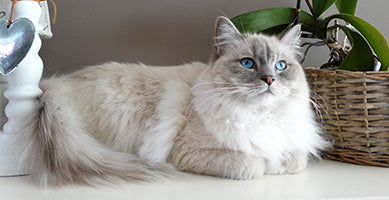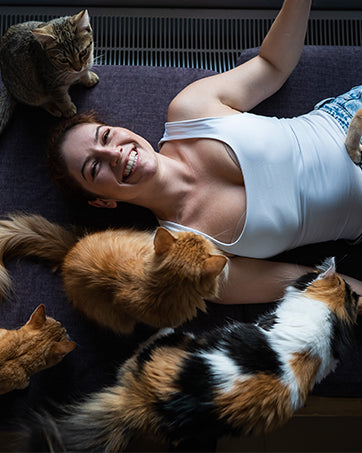Jessica W. Kelvin - Mar.05.2024
Why Do Cats Eat Grass?
7 Insights into Feline Behavior

How To Stop a Cat From Peeing Everywhere in the House
Est. read time: 8 min.
EEvery cat owner knows the frustration of discovering a surprise puddle or an unexpected stain on the carpet. Cats peeing outside their litter box is not only a nuisance but also a sign that something might be amiss. Whether it's a medical issue, stress, or dissatisfaction with their litter box environment, understanding the root cause is key to stopping this behavior. This blog explores the common reasons behind this unsettling behavior and offers practical solutions to help keep your house clean and odor-free. Among these solutions, we'll introduce an innovative product by vividmoo: an intelligent automatic cleaning cat litter box designed to revolutionize pet care and address many of the underlying issues related to inappropriate urination.
Understanding Why Cats Pee Outside the Litter Box
Medical Issues
Cats are notorious for hiding discomfort or illness, making it challenging to identify health problems until they become serious. One of the first signs of a medical issue can be changes in urination habits. Conditions such as Urinary Tract Infections (UTIs), kidney disease, diabetes, or bladder stones can cause pain during urination, leading cats to associate the litter box with discomfort. Consequently, they might start avoiding it altogether. Regular veterinary check-ups and immediate consultation upon noticing signs of distress are crucial in diagnosing and treating these conditions.
Behavioral Reasons
Beyond medical causes, a cat's behavior can be influenced by stress, anxiety, or changes in their environment. Moving to a new home, the arrival of a new pet or family member, or even alterations in the daily routine can deeply affect your cat. Additionally, cats are territorial animals, and the presence of outdoor cats near their indoor space can trigger stress and result in marking behavior. Understanding these triggers and providing a stable, stress-free environment is essential in managing inappropriate urination.
Issues with the Current Litter Box
The litter box itself can often be the culprit behind your cat's avoidance. Factors to consider include its cleanliness, the type of litter used, the box's location, and the number of litter boxes available in multi-cat households. A box that's too dirty, located in a high-traffic area, or filled with a type of litter your cat dislikes can deter them from using it. Furthermore, the rule of thumb is to have one more litter box than the number of cats in your home to prevent competition and stress.

Solutions to Prevent Inappropriate Urination
Addressing Medical and Behavioral Issues
The first step in tackling inappropriate urination is to consult with a veterinarian. Identifying and treating any medical conditions early can prevent further discomfort for your cat and avoid complications. In cases where behavioral issues are diagnosed, your vet may recommend environmental modifications, stress-reduction techniques, or in some cases, medication. Creating a safe and secure environment, along with regular playtime and attention, can significantly reduce your cat's stress levels and discourage marking behaviors.
Improving the Litter Box Experience
Enhancing your cat's litter box experience can drastically reduce incidents of inappropriate urination. Here are a few tips:
Choose the Right Litter: Cats have preferences when it comes to the texture and scent of their litter. Experiment with different types until you find the one your cat prefers.
Keep It Clean: Regular cleaning of the litter box is essential. Remove waste daily and change the litter frequently to maintain a fresh and inviting environment for your cat.
Optimal Location: Place the litter box in a quiet, low-traffic area where your cat feels safe. Avoid locations near noisy appliances or in cramped spaces.
Cats:Theobromine Toxic Consumption
Most Cats: 1-10 lbs(0.45-4.6 kg), Large Cats11-25 lbs(5-11.4 kg)
Cacao Beans: Most Cats> 0.05 oz, Large Cats> 0.5 0z
Unsweetened Baking Chocolate: Most Cats> 0.2 oz, Large Cats>2 0z
Dark Chocolate: Most Cats> 0.5 0z, Large Cats>7 oz
Milk Chocolate: Most Cats>1.5 0z, Large Cats>16.5 0Z
White Chocolate: Most Cats>360 oz, Large Cats>4000 0z
Cocoa Powder: Most Cats> 01 0z, Large Cats>10z
Cocoa Bean Mulch: Most Cats>0.1 0z, Large Cats>1 0z
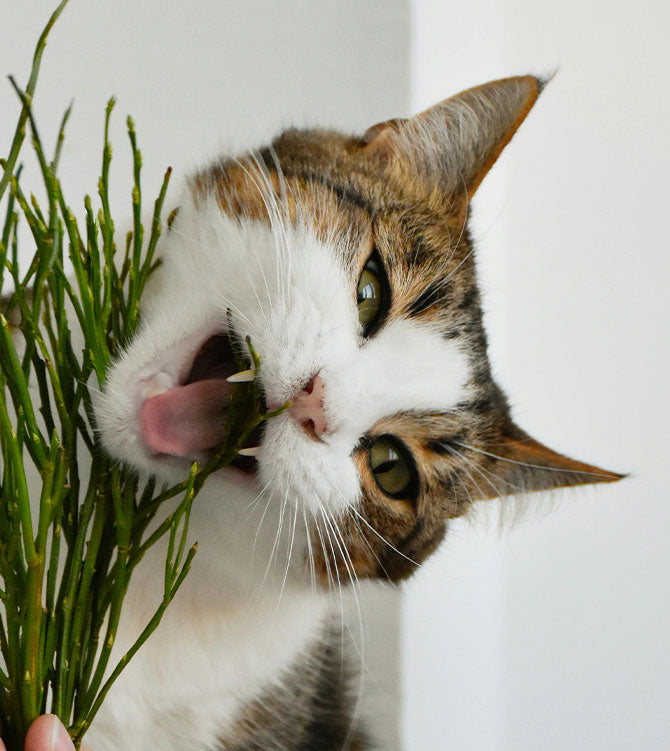
Showing making procedure is a good way to guarantee product quality
Stress Relief
Eating grass can also serve as a form of stress relief for cats, providing a calming activity that distracts from anxiety or boredom.
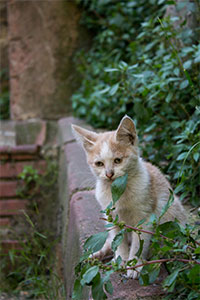
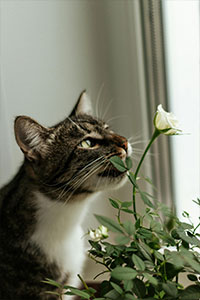
Get customer attention by clean visual and video
Instinctual Actions
Grass eating is an instinctual behavior that may stem from a cat's need to seek out alternative food sources or to induce vomiting to clear their stomachs of indigestible materials.
vividmoo’s Intelligent Automatic Cleaning Cat Litter Box
vividmoo’s intelligent automatic cleaning cat litter box is designed to address many common litter box issues head-on. This innovative product ensures that the litter box is always clean, reducing the likelihood of your cat avoiding it due to messiness or odor. The automatic cleaning function minimizes the need for daily manual scooping, making it ideal for busy pet owners. Additionally, its quiet operation does not startle cats, ensuring they feel safe and comfortable using it. By keeping the litter box environment consistently clean and odor-free, vividmoo’s litter box helps eliminate one of the primary reasons cats pee outside their designated area.
Lifestyle Changes and Additional Tips
Routine and Environment
Maintaining a stable routine and a calm environment is vital for cats, especially those prone to stress. Consistency in feeding times, play sessions, and cuddles can help your cat feel secure. Ensure their environment is enriched with climbing shelves, toys, and hiding spots to stimulate their natural behaviors and provide a sense of safety.
Other Tips
Feline Pheromone Diffusers: These can help in calming cats and reducing stress-related behaviors, including inappropriate urination.
More Playtime: Engaging your cat in regular play can alleviate boredom and reduce stress, lowering the chances of marking behavior.
Multiple Litter Boxes: In multi-cat households, having several litter boxes can prevent competition and stress, reducing the likelihood of cats peeing outside the box.
Article credit: Heidi Cohen (https://heidicohen.com/use-blog-to-sell/)
Digestive Aid
Grass acts as a natural laxative, helping cats pass hairballs or other indigestible items through their digestive tract more easily.
Elimination of Parasites
It's also theorized that grass eating may help cats eliminate intestinal parasites, although this benefit is more anecdotal than scientifically proven.
Conclusion
Understanding why cats pee outside the litter box and addressing these issues is crucial for any pet owner. From medical conditions to environmental stresses, identifying the root cause is the first step towards a solution. Incorporating strategies such as improving the litter box experience, making lifestyle adjustments, and using products like vividmoo’s intelligent automatic cleaning cat litter box can make a significant difference. This innovative product not only alleviates the burden of maintaining a clean litter box but also contributes to a stress-free environment for your cat. By taking these steps, you can help ensure your furry friend remains happy, healthy, and well-behaved, keeping your home clean and odor-free.
How to Safely Introduce Grass to Your Cat
Suitable Types of Grass
Certain types of grass are more beneficial and safer for cats, including wheatgrass, which is often sold as "cat grass."
Growing Your Own Cat
Grass
For the safety and health of your cat, consider growing your own cat grass at home. It's a simple and effective way to ensure they're getting a safe product.
Alternative Behaviors and Solutions
Dietary Supplements
If your cat shows an excessive interest in eating grass, it might indicate a dietary deficiency. Consult with a veterinarian about supplementing your cat's diet.
Behavioral Enrichment
Providing toys, climbing structures, and engaging activities can reduce your cat's inclination to eat grass by offering alternative forms of stimulation.
Why Do Cats Eat Grass?
Exploring the curiosity behind this behavior reveals a complex blend of nutritional, psychological, and instinctual factors. Understanding these can help cat owners provide better care and enrichment for their feline friends.
Owner Experiences and Advice
Personal Anecdotes
Many cat owners have observed their pets eating grass and have noted the benefits or concerns that came with it. Sharing these experiences can offer valuable insights for other pet owners.
Expert Recommendations
Veterinarians and animal behaviorists can provide professional advice on managing grass-eating behavior, ensuring it remains a safe and positive experience for your cat.
FAQs
Cats should not eat chocolate ice cream; not only is chocolate toxic to cats, but ice cream often contains toxic ingredient propylene glycol. Ingesting propylene glycol can lead to anemia in cats.
Say it at the end
Understanding why cats eat grass sheds light on their complex behaviors and the natural instincts that drive them. By providing safe, suitable grass and paying attention to the underlying reasons for this behavior, cat owners can ensure their feline companions lead happy, healthy lives.



